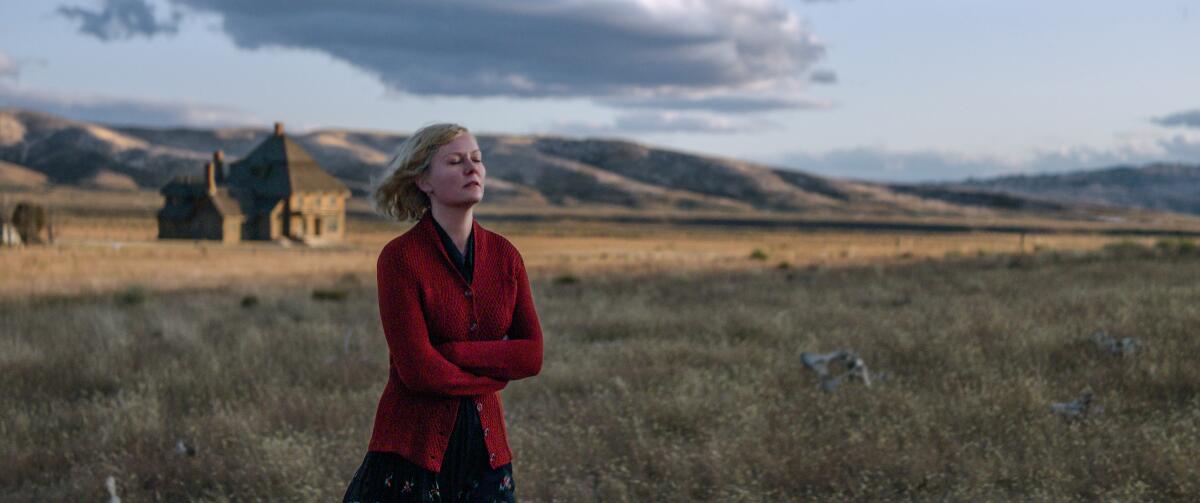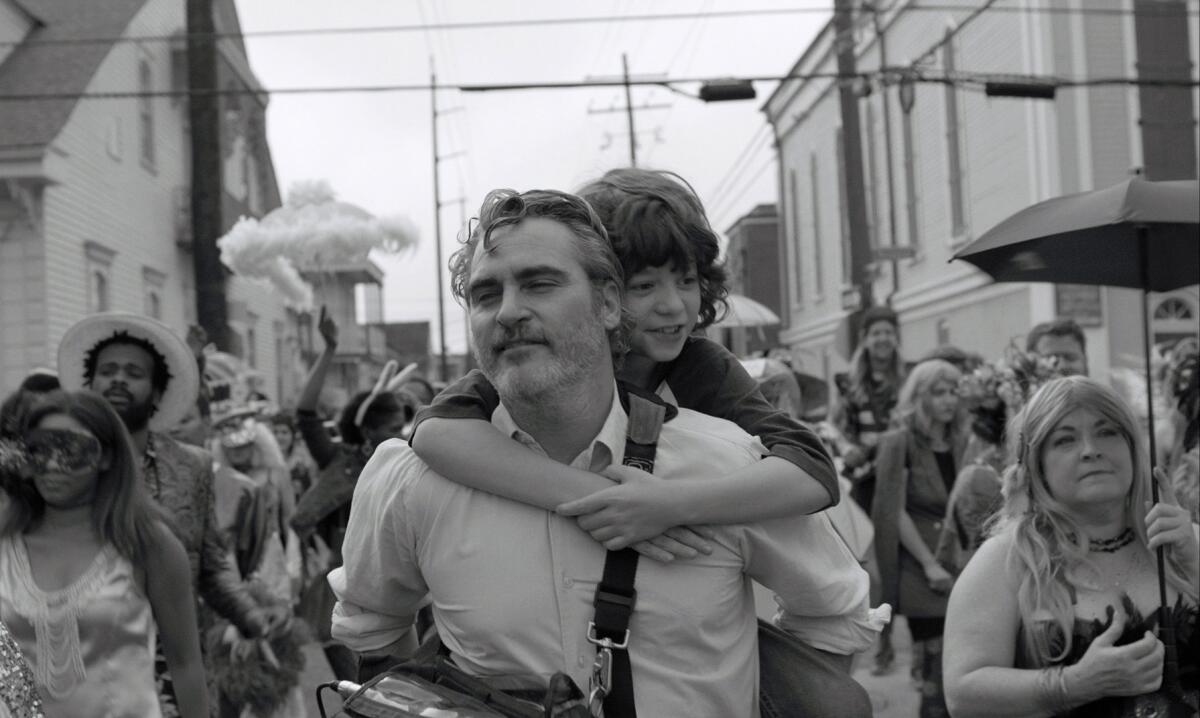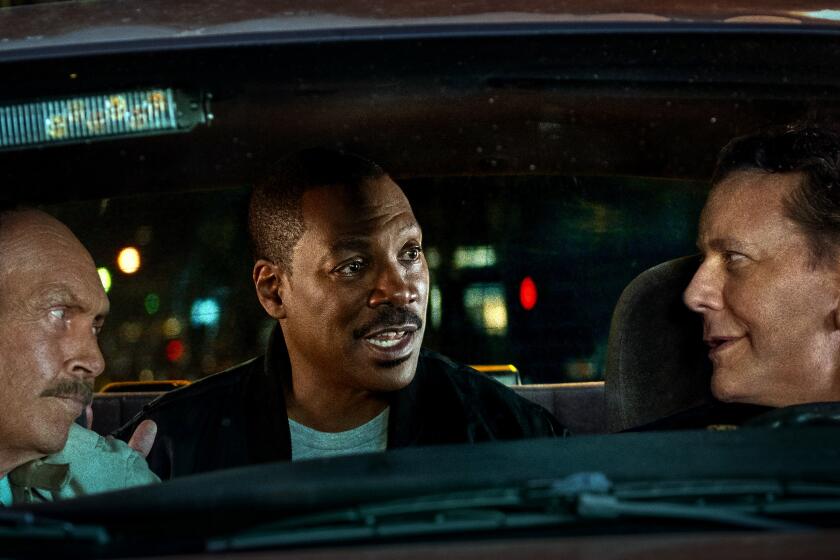Jane Campion returns with ‘The Power of the Dog’
Hello! I’m Mark Olsen. Welcome to another edition of your regular field guide to a world of Only Good Movies.
Only good movies
Get the Indie Focus newsletter, Mark Olsen's weekly guide to the world of cinema.
You may occasionally receive promotional content from the Los Angeles Times.
This is another big week with more movies than can fit into our regular format, made up of a mix of titles in theaters and on streaming that points to the promise of this new reality of how movies get released as audiences have more options than ever.
Directed by Reinaldo Marcus Green, “King Richard” is available in theaters and streaming on HBO Max. In his review of the film, the story of Richard Williams’ role in daughters Venus and Serena becoming tennis superstars, Times critic Justin Chang called it a “shrewd, slick and enormously satisfying drama.”
Sonaiya Kelley spoke to Will Smith and Aunjanue Ellis. Smith plays Richard Williams, and Ellis plays his wife and the girls’ mother, Oracene Williams. Smith spoke about the pressure of the role when he said, “It wasn’t just the person living, it was his entire family. It was six women that were being depicted. So it was quite daunting for me. And strangely enough, Richard’s opinion was the least scary to me because I felt like I understood him and was confident that he would feel that I did him justice. But I was deeply concerned about Ms. Oracene and Venus and Serena and the girls. I was deeply concerned that they [would feel] that they were captured and depicted authentically and lovingly.”
Lin-Manuel Miranda’s debut feature as a director, “Tick, Tick… Boom!,” is in theaters and streaming now on Netflix. The movie is the story of composer and lyricist Jonathan Larson (Andrew Garfield) in the years of struggle before his untimely death in 1995, just before the blockbuster success of his “Rent.” Justin wrote that the film “feels refreshingly intimate and specific, idealistic but rarely naive, and grounded in a way that gives an unexpected lift to its flights of fancy.”
Ashley Lee spoke to Miranda, Garfield, Larson’s sister Julie Larson and other collaborators. Miranda, expressing his gratitude for being able to make this story his debut as a filmmaker, said, “I learned a couple of things about what I want to do, which is that I love telling musical stories onscreen. Jon [M. Chu] can direct ‘Wicked’ — I don’t need that pressure in my life, he thrives on it! I’ll make the smaller, stranger musicals that wouldn’t otherwise get a green light. If I’m lucky enough to do that, I’d be so happy.”
Don’t forget that the Envelope podcast, co-hosted by myself and Yvonne Villarreal, returns for its second season on Nov. 30. Upcoming episodes feature in-depth conversations with guests including Kirsten Dunst, Halle Berry, Daniel Dae Kim, Adam McKay and more. Listen to the new season trailer and subscribe wherever you get your podcasts.
Enjoying this newsletter? Consider subscribing to the Los Angeles Times
Your support helps us deliver the news that matters most. Become a subscriber.
‘The Power of the Dog’
Jane Campion, who won the directing prize at the Venice International Film Festival for her new film “The Power of the Dog,” is one of the world’s best filmmakers. That her latest is her first feature film since 2009’s “Bright Star” is reason enough to see it; that “Power of the Dog” is so powerful, startling and fresh makes it unmissable. The adaptation of the 1967 novel by Thomas Savage is the story of two brothers, Phil (Benedict Cumberbatch) and George (Jesse Plemons), who run their family’s ranch in 1920s Montana. When George impulsively marries Rose (Kirsten Dunst), who arrives with her son Peter (Kodi Smit-McPhee), tensions build among the four of them. The film is in theaters now and begins streaming on Netflix on Dec. 1.
For The Times, Justin Chang called the film “ brilliantly acted, insidiously gripping,” going on to say, “It’s that near-tactile attention to detail that makes Campion’s signature so distinct, especially in a genre more inclined toward big-picture sweep. She has always been particularly sensitive to her characters’ hands and handiwork: the virtuoso skill with which Holly Hunter tickles the ivories in ‘The Piano,’ but also the ardor with which Abbie Cornish’s fingers clasp a love letter in the ravishing 19th century romance ‘Bright Star.’ Campion has spent her career probing the complex inner worlds of these and other women, giving vivid expression to desires they are often forced to subsume or repress. It comes as little surprise that her insight into the gnarled codes and contradictions of American masculinity is no less piercingly astute.”
For Slate, Dana Stevens wrote, “‘The Power of the Dog’ sometimes feels like Campion’s female-centric reply to Paul Thomas Anderson’s 2007 epic ‘There Will Be Blood.’ Both are intimate chamber dramas about how money and power corrupt human relationships, set against a backdrop of early 20th century capitalism. And both feature a central character — Daniel Day-Lewis’ Daniel Plainview, Cumberbatch’s Phil Burbank — whose arrogantly self-assured demeanor hides a core of bottomless insecurity and, when pushed to the limit, bottomless malevolence. … ‘The Power of the Dog’ is one of those films that, on first viewing, seems to have a story too thin to support the epic sweep of its setting. But watch it a second time through, and the tightly coiled thriller plot comes into focus, with no detail wasted as the movie hurtles toward a violent, psychically shattering, but narratively satisfying ending.”
For Sight and Sound, Nicolas Rapold wrote, “As Phil childishly acts out about his brother actually growing up, he’s also slowly self-destructing in his own fashion. With a suggestiveness more direct than earlier forays into the mythic West, the film orchestrates another kind of archetype in Phil: a man desperately trying to tamp down his sexuality by putting up a rough front to all around him. Cumberbatch summons Lee Marvin’s brash magnetic voice in creating a cowboy who’s know-it-all yet deeply confused, as he idolises an old friend, Bronco Henry, who was so perfect and manly it hurts. … Where it all ends up feels at once cathartic and surprising, a denouement readable as lurid poetic justice and profound tragedy (our ears somehow pricked along the way by the odd high horns in Jonny Greenwood’s score)..”
For the Washington Post, Ann Hornaday wrote, “This is Cumberbatch’s movie, one in which he invests his character with just the right degree of menace, casual erudition and unconscious grief. It might not take long for present-day audiences to figure out what’s at the core of Phil’s rage, especially when Peter comes into his orbit — but there’s still suspense to be found in just how the two men wordlessly navigate the shifts in power and perception that define their ambiguous bond. That bond has to do with how Phil and Peter define manhood, and the lengths to which they’ll go to live up to it — a groundbreaking theme in the 1960s that is just as germane now. ... Once again demonstrating her own strong, clear vision — not to mention superb control of her craft — Campion proves her ability to illuminate hidden truths and let us see what was hiding in plain sight all along.”

‘C’mon, C’mon’
Written and directed by Mike Mills, “C’mon C’mon” completes a loose trilogy on family with his previous “Beginners” and “20th Century Women.” In the new film, radio journalist Johnny (Joaquin Phoenix) suddenly finds himself caring for his young nephew Jesse (Woody Norman) when his sister (Gaby Hoffman) has to help care for the boy’s father (Scoot McNairy). Johnny ends up taking Jesse along on work trips to interview children about their hopes and fears. The film is in theaters.
For The Times, Jessica Kiang wrote, “Mike Mills makes movies that feel like falling in love with your best friend. The familiar becomes momentous and the ordinary turns incandescent; it’s like he’s telling us, again and again, that the things we’re looking for are very often right in front of us, if we’d only pay them the right kind of attention. His new film, ‘C’mon C’mon’ — a giddily impatient title for a movie that is anything but — is all about that kind of attention and the discoveries it can yield, about others and about ourselves. And if its rueful, midlife nostalgia doesn’t carry quite the same current of vibrant, urgent empathy as ‘20th Century Women’ or ‘Beginners,’ the small, polished pebbles of wisdom it unearths are still a pleasure to observe as they’re sent skimming across the surface of a delicate, compassionate film. For all its indulgent introspection, Mills’ latest remains miraculously unpunchable.”
Josh Rottenberg spoke to Phoenix and Norman for an upcoming story for The Times. Asked how they guarded against the film’s premise lapsing into cloying sentimentality, Phoenix said, “That was a danger that Mike and I were aware of from the very beginning. Trying to ensure that something was genuine and authentic and there wasn’t any artifice — in a medium that’s oftentimes blanketed in artifice — that’s what was exciting about it. What I hadn’t really anticipated was that I would have this great barometer of what was authentic sitting in front of me every day in Woody and how he inhabited this world and that character. This is not Woody in the film. He was hyperaware of the complexities of the character he was playing. And yet it always felt genuine.”
For the New York Times, Manohla Dargis wrote, “While the story’s emotional weight is meant to rest in the moments of tenderness between [Johnny and Jesse], and especially how they affect Johnny — his issues, his growth, his capacity for love — the characters never register as deeply or have the poignancy of the scenes with the nonprofessional children whom Johnny interviews. … These kids aren’t fictional, and their inclusion is a terrible miscalculation: ‘C’mon C’mon’ is too slight and too narrow a vessel to bear the intense weight of their reality. These children are tentative, painfully sincere and at times terribly raw. And while their future may not necessarily be bright, unlike Johnny, they manifestly do live in the mind-blowing, heartbreaking great big world.”
For Vanity Fair, Richard Lawson wrote, “We’ve seen plenty of films in which an independent person is suddenly saddled with a child; it’s become a hoary film trope, sometimes used effectively, but very often in service of the most basic themes. Raising kids is difficult, grownup sacrifices must be made — but valuable lessons are learned. ... Aware of all that formula, Mills takes the time to specify what it might mean for these particular people. He peppers his complicated, credible conversations with idiosyncratic detail. Characters react in ways that real humans might when faced with the weary difficulties of being alive, the struggles of tending to yourself and to others. Mills makes this genre feel new and insightful, as if he’s one of only a few filmmakers who has tackled the complex dynamic between adult and child.”

‘Compartment No. 6’
From Finnish filmmaker Juho Kuosmanen, “Compartment No. 6” is the story of a Finnish grad student Laura (Seidi Haarla) who, having broken off a bad affair with a professor, decides to go to see the remote petroglyphs in an arctic port town. She soon finds herself sharing a cramped train compartment with a Russian miner named Ljoha (Yuriy Borisov). Finland’s entry for the international feature Oscar, the film was co-winner of the Grand Prix at Cannes and is playing in theaters in an awards qualifying run.
For The Times, Robert Abele wrote, “As ‘Compartment No. 6’ reaches its destination — and getting to the petroglyphs brings its own risks and rewards — our hope for Laura and Ljoha feels suitably organic, rather than tied to how other movies engineer meet-cutes into ever-afters. Here, as we warm to how they stumble toward seeing the truth in each other, it’s about what is right for the alone-together bond these two souls create. It makes for a take on the love story as fresh, resonant and honest — so yes, unlikely — as you’ll find in a contemporary film.”
For Variety, Jessica Kiang wrote, “For anyone who’s ever got drunk on bad schnapps with a stranger, for anyone who’s ever been properly alone in a nowhere-town and spoken to a dial tone just to look like they had something to do, for anyone who’s ever been asked how to say “I love you” in their language and has patiently sounded out the words for “F— you” … Juho Kuosmanen’s deeply delightful Cannes competition title ’Compartment No. 6’ plays less like a film than an incredibly detailed, richly textured memory. And for all the people who’ve never done any of those things, now you have.”
For the Guardian, Peter Bradshaw wrote, “Despite the bone-chilling cold of its location in Murmansk in Russia’s remote north-west, there’s a wonderful human warmth and humour in this offbeat romantic story of strangers on a train. … Of course, it isn’t too much of a stretch to see that after their meet-uncute, the relationship of Vadim and Laura is going to thaw. The romance that flowers between these two young people is in parallel with the romance of a long rail journey, and this is a very non-American equivalent of Richard Linklater’s ‘Before Sunrise’ movies.”

Only good movies
Get the Indie Focus newsletter, Mark Olsen's weekly guide to the world of cinema.
You may occasionally receive promotional content from the Los Angeles Times.



